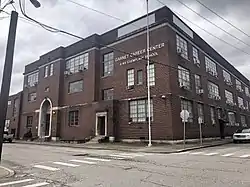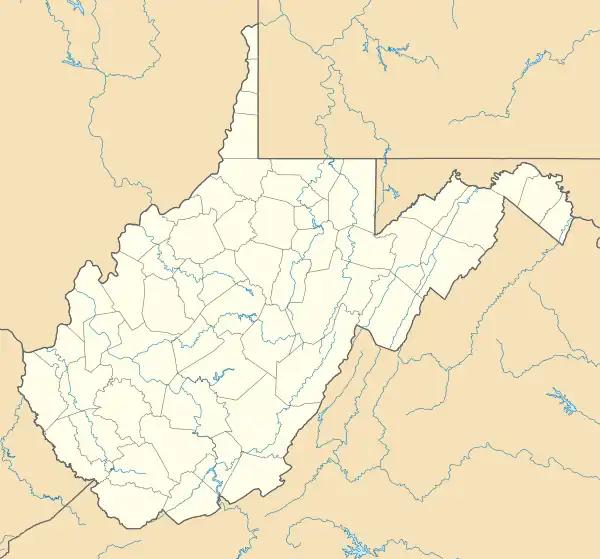Garnet High School
Garnet High School, also known as Garnet Career Center and Garnet Adult Education Center, is a historic African-American high school in Charleston, West Virginia. The school was established when "twelve African-American students in Kanawha County passed an entrance examination for high school level course work."[2] It was named after Henry Highland Garnet, a former slave who became the United States’ ambassador to Liberia.[2] It is a three-story, brick structure, constructed in 1928-29 from the plans of the prestigious Charleston architectural firm of Warne, Tucker, Silling and Hutchison, and dedicated December 2 to 4, 1929. The façade features a limestone-arched entrance containing two sets of double doors, transom light, and a limestone tympanum. Garnet was one of three high schools in the Kanawha Valley built for African-American students. It closed as a high school in 1956, following integration of the public schools,[2] but has been used as a public resource building since that time.[3]
Garnet High School | |
 | |
  | |
| Location | 422 Dickinson St., Charleston, West Virginia |
|---|---|
| Coordinates | 38°21′4″N 81°37′48″W |
| Area | The Block |
| Built | 1928 |
| Architect | Warne, Tucker, Silling & Hutchison |
| Architectural style | Classical Revival |
| NRHP reference No. | 90001068 [1] |
| Added to NRHP | July 24, 1990 |
It was listed on the National Register of Historic Places in 1990.[1]
Oscar Holmes (1916–2001) graduated from this school and became the first African-American Naval Aviator and air traffic controller.[4][5][6]
Gallery
 Garnet High School entry, April 2009
Garnet High School entry, April 2009
References
- "National Register Information System". National Register of Historic Places. National Park Service. March 13, 2009.
- "Integration of Garnet High School, Charleston, West Virginia". The Carter Woodson Project. Retrieved 2021-05-17.
- "National Register of Historic Places Inventory Nomination Form" (PDF). Garnet High School. State of West Virginia, West Virginia Division of Culture and History, Historic Preservation. 2009-04-04.
- Kraus, Terry. "Oscar Holmes: He Broke Three Color Barriers, but Few Knew" (PDF). Federal Aviation Administration.
- Schneller, Robert J., Jr. (January–February 1998). "Oscar Holmes: A Place in Naval Aviation" (PDF). Naval Aviation News. United States Navy.
{{cite magazine}}: CS1 maint: multiple names: authors list (link) - Fikes, Robert (6 December 2015). "Oscar Wayman Holmes Jr. (1916–2001)". BlackPast.org.
